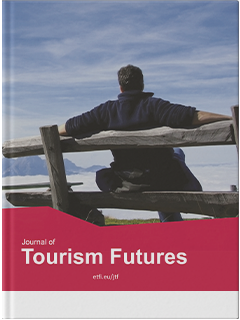Electronic word of mouth for the choice of wellness tourism destination image and the moderating role of COVID-19 pandemic
IF 5.8
Q1 HOSPITALITY, LEISURE, SPORT & TOURISM
引用次数: 0
Abstract
PurposeInformation technology as a source of information and decision-making has wider acceptance in contemporary times. Studies have identified the importance of electronic word of mouth (eWOM) and its impact on decision-making. The primary objective of this research is to investigate the relationship between eWOM (pre-travel), destination image (post-visit), tourist satisfaction and eWOM intentions post the COVID-19 crisis. This study is important as it is anticipated that in the post-pandemic world, tourists would seek well-being-enhancing experiences more often than any other form of tourism.Design/methodology/approachData were collected through an online questionnaire circulated over a period of six months from November 2020 to April 2021. Non-probability purposive sampling technique was used.FindingsThe results depicted that wellness destination’s image has a significant influence on wellness tourists’ satisfaction level and their eWOM intentions. Furthermore, it also came to light that the satisfaction level of wellness tourist satisfaction was found to be significantly influencing their eWOM intentions. The mediating role of wellness tourists’ satisfaction was found to be significant from destination image (post-visit) to eWOM intentions. COVID-19 pandemic perceived health risk was also found to be significantly moderating the relationship between eWOM (pre-travel) and eWOM intentions.Originality/valuePre-travel online information about a wellness destination is an important determinant of travel decisions, especially during the COVID-19 crisis. This empirical study proves that effective use of this information can advance a destination’s marketing efforts and ensure future demand.电子口碑对健康旅游目的地形象选择及COVID-19大流行的调节作用
信息技术作为一种信息和决策的来源,在当代得到了更广泛的接受。研究已经确定了电子口碑(edom)的重要性及其对决策的影响。本研究的主要目的是调查新冠肺炎危机后eWOM(旅行前)、目的地形象(访问后)、游客满意度和eWOM意向之间的关系。这项研究很重要,因为预计在大流行后的世界,游客将比任何其他形式的旅游更频繁地寻求增进福祉的体验。设计/方法/方法数据是通过在线问卷收集的,从2020年11月到2021年4月为期6个月。采用非概率目的抽样技术。结果发现:健康旅游目的地形象对健康游客满意度和旅游意向有显著影响。此外,本研究还发现,健康旅游满意度对旅游意向有显著影响。从目的地形象(访后)到健康旅游意向,健康游客满意度的中介作用显著。研究还发现,COVID-19大流行的感知健康风险显著调节了外出旅行(旅行前)和外出旅行意图之间的关系。独创性/价值旅行前关于健康目的地的在线信息是旅行决策的重要决定因素,特别是在2019冠状病毒病危机期间。这一实证研究证明,有效利用这些信息可以促进目的地的营销努力,并确保未来的需求。
本文章由计算机程序翻译,如有差异,请以英文原文为准。
求助全文
约1分钟内获得全文
求助全文
来源期刊

Journal of Tourism Futures
HOSPITALITY, LEISURE, SPORT & TOURISM-
CiteScore
15.70
自引率
6.00%
发文量
64
审稿时长
34 weeks
期刊介绍:
 求助内容:
求助内容: 应助结果提醒方式:
应助结果提醒方式:


